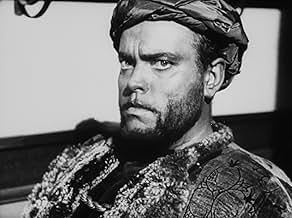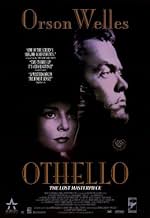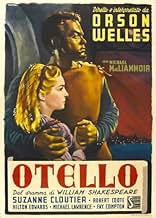IMDb RATING
7.5/10
10K
YOUR RATING
The Moorish General Othello is manipulated into thinking that his new wife Desdemona has been carrying on an affair with his Lieutenant Michael Cassio when in reality, it is all part of the ... Read allThe Moorish General Othello is manipulated into thinking that his new wife Desdemona has been carrying on an affair with his Lieutenant Michael Cassio when in reality, it is all part of the scheme of a bitter Ensign named Iago.The Moorish General Othello is manipulated into thinking that his new wife Desdemona has been carrying on an affair with his Lieutenant Michael Cassio when in reality, it is all part of the scheme of a bitter Ensign named Iago.
- Director
- Writers
- Stars
- Awards
- 1 win & 1 nomination total
Jean Davis
- Montano
- (uncredited)
Abdullah Ben Mohamet
- Pageboy
- (uncredited)
Joseph Cotten
- Senator
- (uncredited)
Joan Fontaine
- Page
- (uncredited)
Robert Rietty
- Lodovico
- (voice)
- (uncredited)
Gudrun Ure
- Desdemona
- (voice)
- (uncredited)
- Director
- Writers
- All cast & crew
- Production, box office & more at IMDbPro
7.510K
1
2
3
4
5
6
7
8
9
10
Featured reviews
Welles' indomitable spirit in the face of penury shines in yet another Wellesian Masterpiece
THE TRAGEDY OF OTHELLO: THE MOOR OF VENICE/ US/France/Italy/Morocco 1952 (3.5 STARS)
The recent restoration of Othello brings to cinematic space the magic of another masterpiece from Orson Welles. To think that a whole master negative of this film (which won the Best film at Cannes in 1952) was lying abandoned in a New Jersey warehouse, was discovered by accident and is the reason for this print that we now have access to, is enough to send shivers down the spine of any Welles-phile. . Mise-en-scene: Like with many of his other works involving especially Shakespeare, be prepared for Welles' licenses and personal interpretation of subject matter pertaining to Othello. Yet at the end, we are left with a feeling of deep tragedy and loss for Othello, played by Welles himself, and though we feel that Othello was quite an idiot, we at least feel that he was a very unfortunate idiot at that! . The problem may have been that the critical scene where Iago poisons Othello's mind and fuels his suspicion is scrappy and left unexplored. This may well have had little to do with Welles' artistic choices, and more with his monetary situation at the time. Welles' penury through his European sojourn is widely known and the passion with which he would invest into his films, every penny earned through moonlighting his booming voice and above-average acting skills is legendary, and should put this in context.
. The figure behavior of Micheál MacLiammóir is utterly convincing as the detestable Iago who is consumed by jealousy and rage at being overlooked as the second-in-command. But the person to steal our hearts is Suzanne Cloutier who portrays the fair-dame Desdemona. She is every bit as dainty as we would have imagined her to be. . The stripped down set design works wonderfully for the film and even though budgets may have been the driving force, Othello's barren palace is preceded only by the barrenness of his blinding jealousy and irrational actions. . Cinematography: As we have come to expect, Orson Welles has a unique cinematic language, through which he creates a Wellesian world of skin-burning close ups, dutched crazy world-frames and low angle shots to create a tense atmosphere of foreboding. But there is no better example of exploring and using frame depth than in Othello. Time and again Welles plays with foreground element to reveal psychologically subjective and meta-diagetic moods while cleverly using the depth in the frame to forward the narrative and plot the next progression. The title shots of the film are harrowing in their effect, with the interplay of high-contrast earth and sky contours that at once establish the mood for an intense cinematic experience. . Sound & Editing: The restored version has a brand-new soundtrack mentored by Welles' daughter, and while it enhances the experience to telling effect, it is irony to note that just the new soundtrack cost much more than what Welles assembled the whole film for. The fact that parts of the film were shot MOS and other parts used ADR is distracting due to the obvious lack of lip-sync, but in the final analysis, we watch Welles with reverence almost as if on a visit to Sunday Mass, paying homage, never once forgetting that were are witness to a filmmaker stripped of resources, devoid of many essential tools, but one with indomitable spirit who refused to be cowed-down. Othello is magical in its story telling and another worthy showcase of the genius of Orson Welles.
The recent restoration of Othello brings to cinematic space the magic of another masterpiece from Orson Welles. To think that a whole master negative of this film (which won the Best film at Cannes in 1952) was lying abandoned in a New Jersey warehouse, was discovered by accident and is the reason for this print that we now have access to, is enough to send shivers down the spine of any Welles-phile. . Mise-en-scene: Like with many of his other works involving especially Shakespeare, be prepared for Welles' licenses and personal interpretation of subject matter pertaining to Othello. Yet at the end, we are left with a feeling of deep tragedy and loss for Othello, played by Welles himself, and though we feel that Othello was quite an idiot, we at least feel that he was a very unfortunate idiot at that! . The problem may have been that the critical scene where Iago poisons Othello's mind and fuels his suspicion is scrappy and left unexplored. This may well have had little to do with Welles' artistic choices, and more with his monetary situation at the time. Welles' penury through his European sojourn is widely known and the passion with which he would invest into his films, every penny earned through moonlighting his booming voice and above-average acting skills is legendary, and should put this in context.
. The figure behavior of Micheál MacLiammóir is utterly convincing as the detestable Iago who is consumed by jealousy and rage at being overlooked as the second-in-command. But the person to steal our hearts is Suzanne Cloutier who portrays the fair-dame Desdemona. She is every bit as dainty as we would have imagined her to be. . The stripped down set design works wonderfully for the film and even though budgets may have been the driving force, Othello's barren palace is preceded only by the barrenness of his blinding jealousy and irrational actions. . Cinematography: As we have come to expect, Orson Welles has a unique cinematic language, through which he creates a Wellesian world of skin-burning close ups, dutched crazy world-frames and low angle shots to create a tense atmosphere of foreboding. But there is no better example of exploring and using frame depth than in Othello. Time and again Welles plays with foreground element to reveal psychologically subjective and meta-diagetic moods while cleverly using the depth in the frame to forward the narrative and plot the next progression. The title shots of the film are harrowing in their effect, with the interplay of high-contrast earth and sky contours that at once establish the mood for an intense cinematic experience. . Sound & Editing: The restored version has a brand-new soundtrack mentored by Welles' daughter, and while it enhances the experience to telling effect, it is irony to note that just the new soundtrack cost much more than what Welles assembled the whole film for. The fact that parts of the film were shot MOS and other parts used ADR is distracting due to the obvious lack of lip-sync, but in the final analysis, we watch Welles with reverence almost as if on a visit to Sunday Mass, paying homage, never once forgetting that were are witness to a filmmaker stripped of resources, devoid of many essential tools, but one with indomitable spirit who refused to be cowed-down. Othello is magical in its story telling and another worthy showcase of the genius of Orson Welles.
Great film, but not "lost"
I will not go into the film as many already have said how it is a great work of art despite its "troubled" filming history.
This film is now advertised and available as a "restored" dvd of a "lost" Welles film. But DO NOT be deceived. Whereas the 1998 cut of Touch of Evil was "restored" using a Welles memo as guidelines, Othello was restored by presuming many things. First, dialogue was put in sync and unintelligible diaglogue was "voiced over." And second, the original score was redone, but not exactly as the original. You could almost say a new score was used in the "restored" film. The original cut was Welles' 1952 European version which has only ever been availible as a (OOP) 1995 Criterion LaserDisc. As Welles' daughter owns the rights to Othello, that's the 1992 "restored" version which she also helped on, it is the only one currently availible for purchase in the US (as she receives no money for the 1995 CR laserdisc, she forced Criterion to stop making it.)
While many casual fans will not notice or care about the little changes, don't be deceived into thinking this is "Orson's intended version." Also DO NOT be deceived into thinking this is a lost film. It was only lost in the sense that it had no distribution until the early 90's.
This film is now advertised and available as a "restored" dvd of a "lost" Welles film. But DO NOT be deceived. Whereas the 1998 cut of Touch of Evil was "restored" using a Welles memo as guidelines, Othello was restored by presuming many things. First, dialogue was put in sync and unintelligible diaglogue was "voiced over." And second, the original score was redone, but not exactly as the original. You could almost say a new score was used in the "restored" film. The original cut was Welles' 1952 European version which has only ever been availible as a (OOP) 1995 Criterion LaserDisc. As Welles' daughter owns the rights to Othello, that's the 1992 "restored" version which she also helped on, it is the only one currently availible for purchase in the US (as she receives no money for the 1995 CR laserdisc, she forced Criterion to stop making it.)
While many casual fans will not notice or care about the little changes, don't be deceived into thinking this is "Orson's intended version." Also DO NOT be deceived into thinking this is a lost film. It was only lost in the sense that it had no distribution until the early 90's.
Welles brings it !
The power of Welles performance should make anyone not already an admirer stand up and take notice. The dark, brooding nature of Welles character sets the tone throughout this film. Each of the prominent characters seems to feed off this intensity, making each the better for it. The spartan sets and excellent use of lighting add to this powerful delivery making the words feel true and soul wrenching. I think this production could have been played out on a bare stage and still be regarded as a fine work, the dialogue and delivery is of such fine caliber. "The Moor of Venice" is a fine example of Orson Welles vast talents as a performer and director and should not be missed.
powerful, compact version
Orson Welles' short, low-budget, and in places fairly odd look at Shakespeare's play. It suffers from some stage-bound performances which don't quite work (Micheal MacLiammoir as Iago, Robert Coote as Rodrigo) plus an undefined Desdemona from Suzanne Cloutier.
However, this aside, Welles is marvellous as the Moor driven to jealousy and murder, his voice rolling through the meat of Othello's speeches, his bronze make-up creating a skin for the great general. For this performance alone the film is valuable. And it looks absolutely fantastic, springing off from its financial limitations and adding a new dimension to the often-told story.
However, this aside, Welles is marvellous as the Moor driven to jealousy and murder, his voice rolling through the meat of Othello's speeches, his bronze make-up creating a skin for the great general. For this performance alone the film is valuable. And it looks absolutely fantastic, springing off from its financial limitations and adding a new dimension to the often-told story.
Dimensional Filmmaking
Commenting on Shakespeare films is rather like admiring Easter Eggs.
First the inside: this was never a great play, relative to Shakespeare's other works. His great plays are about ideas, with characters as vectors to prod and activate them. This play is merely about characters, which makes it attractive to actors. That's certainly why Welles selected it.
Welles is the Sinatra of dramatic reading, with phrasing mastered in his radio days. All else is acceptable (at least to my tastes) so far as the play goes.
Now the shell, and here is what makes this film one of the most important. When Welles moved into film, he did so as an architect. He understood that great film constructs a space that includes the audience. So he worked with the most direct tools, buildings themselves. These sets are remarkable. I cannot imagine how he found them, how he could have seen the possibilities.
Selection aside, how he uses the spaces! View this film at least once in silence. I rate Welles as one of the 20th century's great architects and predict that this film will be mined when we get around to really creating cyberbuilding.
First the inside: this was never a great play, relative to Shakespeare's other works. His great plays are about ideas, with characters as vectors to prod and activate them. This play is merely about characters, which makes it attractive to actors. That's certainly why Welles selected it.
Welles is the Sinatra of dramatic reading, with phrasing mastered in his radio days. All else is acceptable (at least to my tastes) so far as the play goes.
Now the shell, and here is what makes this film one of the most important. When Welles moved into film, he did so as an architect. He understood that great film constructs a space that includes the audience. So he worked with the most direct tools, buildings themselves. These sets are remarkable. I cannot imagine how he found them, how he could have seen the possibilities.
Selection aside, how he uses the spaces! View this film at least once in silence. I rate Welles as one of the 20th century's great architects and predict that this film will be mined when we get around to really creating cyberbuilding.
Did you know
- TriviaWhen he made The Black Rose (1950), Orson Welles insisted that the coat his character wore be lined with mink, even though the lining would never be visible in the finished film. The producers acquiesced to this demand. When the shoot was over, the coat disappeared. In "Othello", Orson Welles can be seen wearing the same coat, complete with mink lining.
- Alternate versionsThis film by Orson Welles, was 'restored' by a group in Chicago in 1991/2. The film was transferred to, and enhanced in video, (D1 format) retaining it as black and white. The audio was completely rebuilt, including the score, in Stereo Surround. All dialogue, however was original. This was a problem as some of the dialogue was distorted and unintelligible. John Fogelson, editor, was a major supervisor of the project. Ed Golya, Lorita DeLacerna, and Steve Wilke, were digital editors. And Ed Golya remixed the soundtrack. The process took 9 months. It was purchased for distribution by Castle Hill, and taken to New York where it went through another transformation before release. The restoration engineer in New York, Paul Michael, restored the audio that was supplied on 35mm optical negatives. He was able to remove the distortion, optical pops and surface noise that is inherent with Optical negatives. The restored audio was then sent to Sound One for the final mix. Unintelligible dialogue was replaced with 'sound-alikes'. This decision was made for the entertainment value of the film. The original mono music was then reintroduced into the final product. Basically, the film was retransferred, and the rebuilt sound effects tracks were added. This was done at Sound One, in NYC.. The credits were adjusted to place Lee Dickter (sp?) as Re-recording Mixer, and Ed Golya as Sound Effects Editor.
- ConnectionsEdited into Histoire(s) du cinéma: La monnaie de l'absolu (1999)
- How long is Othello?Powered by Alexa
Details
- Release date
- Countries of origin
- Official sites
- Languages
- Also known as
- Orson Welles' Othello
- Filming locations
- Castle, El Jadida, Morocco(cistern interior)
- Production companies
- See more company credits at IMDbPro
Box office
- Gross US & Canada
- $28,980
- Opening weekend US & Canada
- $6,010
- Apr 27, 2014
- Gross worldwide
- $28,980
- Runtime
- 1h 30m(90 min)
- Color
- Aspect ratio
- 1.37 : 1
Contribute to this page
Suggest an edit or add missing content









































